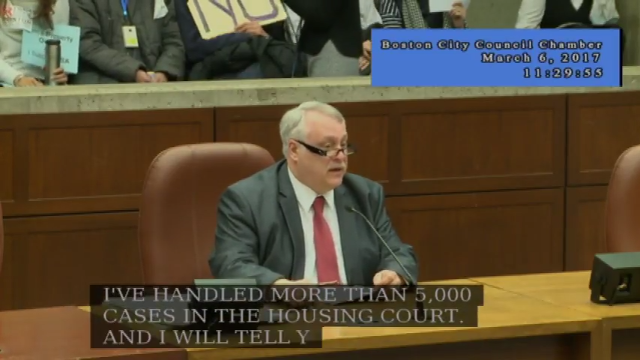Jim Brooks Stabilization Act, H.4142, Sent to Study
| . Posted in evictions, laws, News - 0 Comments

Perhaps the one person most reasonable for the Jim Brooks Act's defeat was Attorney Stuart Schrier. At the March 6, 2017 City of Boston hearing, he introduced novel and compelling arguments for how the act violated state and federal fair debt collection practices, how the data already existed, and how alternative reforms would be more effective at preventing displacement.
Motivation for the Act
Advocates for the act described it as a modest step toward collecting data on displacement. The act would have required owners to copy the City of Boston on their notices to quit. Failure to copy the city would have resulted in dismissal of any eviction case.
The act was winnowed-down from its origins. In a 2016 version, the act prohibited owners from terminating tenancies except for a list of allowable reasons. The list of allowable reasons did not include renovation or refusal to pay certain rent increases. These omissions made renovation and the most common form of rent increase illegal.
The act’s restrictions on terminating tenancies were partially removed but remained in the final text for foreclosing owners. Identical language had been proposed in different bills for municipal properties and “government-involved properties.”
The intent of advocates to impose rent control in stages was clear in public statements made at rallies, where rent increases were the focus.
Opposition to the Act
Landlord groups were opposed to the act for several reasons.
First, by restricting rent increases on some owners, the act would have triggered MGL Chapter 40P, the Rent Control Prohibition Act. Under that act, municipalities may enact rent control if they reimburse owners for the economic losses caused. Sheila Dillon at the City of Boston vehemently denied the act was a form of rent control, setting the stage for a court battle.
Second, by requiring owners to copy the City of Boston on notices to quit for nonpayment, the act violated state and federal fair debt collection practices acts. These laws prohibit disclosure of private debts to any third parties other than attorneys and the courts. Attorney Stuart Schrier in Dorchester said he would enjoin the city against enforcement to protect his client’s compliance with these preexisting laws.
Third, the act was put forth as a joint effort between owners and renters, but MassLandlords’ public record request showed that Mayor Walsh’ office had failed to engage owners in dialog about the bill and had lied about its origins.
The Act, or its Successor, Will Return
Spare Change News quoted Darnell Johnson, one of the renter advocates who crafted the bill, as being frustrated by the whole process. “This bill started out as a strong community protection bill [restricting evictions] and it turned into a data collection bill [copying notices].”
According to Spare Change News, “He [Johnson] said the next step for housing advocates was to regroup and push for stronger legislation with just cause eviction requirements and rent stabilization.”
Alternatives to Just Cause Eviction
Zoning reform that allowed owners to create safe basement and attic spaces, or to subdivide without zoning permission so long as it didn’t expand the envelope of the building, might make a measurable increase in housing supply. It is imperative that the City of Boston include owners in future policy work. Additional regulation without owner input will only create additional housing shortage.
The next legislative session begins January 2019, at which time new bills may be filed or Just Cause Eviction may be refiled.




